Unplugging a refrigerator won’t damage it, but if it’s plugged back in immediately, the compressor motor could overheat. Leaving it unplugged while empty is perfectly safe.
However, be cautious of mold if you leave the doors closed after unplugging them. It’s not recommended to unplug and plug a fridge frequently, as it can damage the compressor. Power outages are not as harmful because the fridge is off during that time.
It’s better to unplug a fridge before a long vacation if it’s not in good condition. Unplugging a fridge won’t affect its performance, but be mindful of how you plug it back in. Leaving a refrigerator unplugged with the door closed can lead to the growth of mold.
It’s best to leave the door open. The temperature inside a fridge needs to be maintained, so it’s not recommended to unplug it.
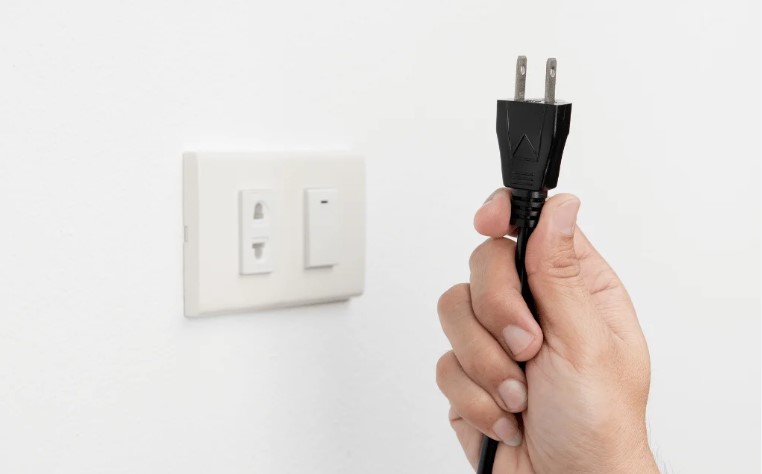
Unplugging A Running Refrigerator: Potential Risks
When it comes to the question of whether unplugging a refrigerator can cause damage, the answer is generally no. Unplugging a refrigerator won’t affect its performance or harm its overall functionality.
However, there is one potential risk to be aware of if you unplug a refrigerator while it is running and then plug it back in immediately.
Overheating The Compressor Motor
One potential risk of unplugging a running refrigerator and then plugging it back in right away is the risk of overheating the compressor motor. Refrigerators rely on gas pressures to function properly, and when a refrigerator is running, the compressor motor generates heat as it compresses the refrigerant gas.
If you unplug the refrigerator while the compressor motor is running and then plug it back in before the gas pressures inside have had time to dissipate, the compressor motor can become seriously overheated. This can potentially damage the motor and affect the overall performance of the refrigerator.
To avoid this risk, it is important to wait for sufficient time for the gas pressures to normalize after unplugging the refrigerator before plugging it back in. This can help prevent any potential overheating of the compressor motor and ensure the longevity and proper functioning of the refrigerator.
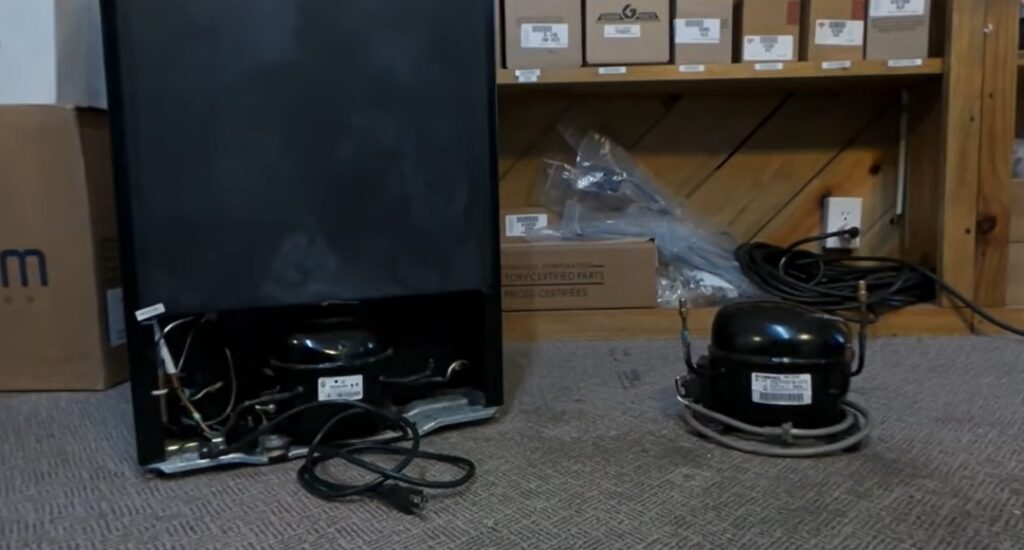
Risk Of Serious Overheating If Plugged In Again Before Gas Pressures Dissipate
One important thing to keep in mind is the risk of serious overheating if you plug in the refrigerator again before the gas pressure has had time to dissipate. This can lead to significant damage to the compressor motor and jeopardize the overall performance and efficiency of the refrigerator.
Therefore, it is crucial to give the refrigerator ample time to stabilize and allow the gas pressures to dissipate before plugging it back in. By doing so, you can minimize the risk of any potential damage and ensure the proper functioning of the refrigerator.
Takeaways:
- Unplugging a running refrigerator and immediately plugging it back in can potentially lead to overheating of the compressor motor.
- The risk arises from not allowing sufficient time for the gas pressure to dissipate, which is necessary for the normal functioning of the refrigerator.
- To avoid damaging the compressor motor, it is essential to wait for the gas pressures to normalize before plugging the refrigerator back in.
- By taking this precaution, you can ensure the longevity and optimal performance of your refrigerator.
Unplugging An Empty Fridge: Safety Precautions
Unplugging a refrigerator does not damage it, unless it is immediately plugged back in while running. It is safe to unplug an empty fridge, but caution should be taken to avoid overheating the compressor motor.
Leaving the fridge unplugged for long periods of time does not harm the compressor or the fridge itself.
Unplugging While Away
Unplugging an empty fridge while you are away is actually perfectly safe and will not cause any damage. In fact, it can be a proactive step to ensure the longevity and efficiency of your refrigerator.
Perfectly Safe And No Damage Caused
Contrary to common misconceptions, simply unplugging a refrigerator won’t harm it. Just like other household appliances, your fridge is designed to handle being unplugged without any adverse effects on its performance.
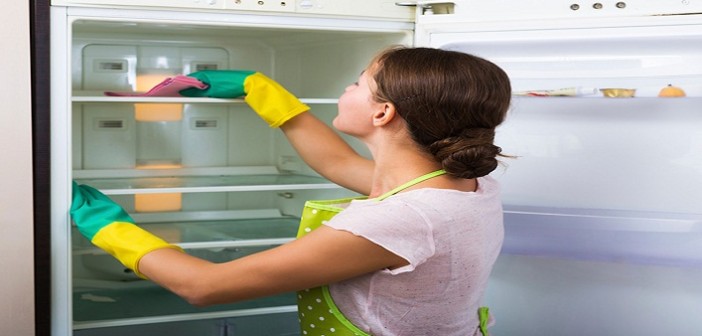
Ensuring The Fridge Is Empty Before Unplugging
Before unplugging your refrigerator, it’s important to ensure that it is completely empty. Remove all perishable items and consume or store them elsewhere.
Leaving perishable items in the fridge while it is unplugged can lead to spoilage and unpleasant odors. Additionally, any liquids left inside may leak and cause further damage to the appliance.
Benefits Of Energy-saving During Extended Periods Of Non-use
Unplugging your refrigerator during extended periods of non-use, such as when you are on vacation or away from home, offers several benefits:
- Energy conservation: By unplugging the fridge, you can reduce your energy consumption and save on electricity bills.
- Environmental impact: Taking steps to minimize energy waste contributes to a more sustainable and eco-friendly lifestyle.
- Longevity of the appliance: Extended periods of non-use can put stress on the compressor, so unplugging the fridge can help extend its lifespan.
It’s important to note that when you do plug the refrigerator back in after a period of unplugging, give it some time for the gas pressure to dissipate. Plugging it in immediately could cause the compressor motor to overheat. Allow a few minutes before plugging it back in to prevent any potential damage.
Overall, as long as you follow these safety precautions, unplugging an empty fridge is perfectly safe and won’t cause any harm to the appliance.
Unplugging The Refrigerator: Potential Concerns
While unplugging a refrigerator typically doesn’t cause any harm, there are a few potential concerns to be aware of. These concerns include leaving the doors closed after unplugging, which can lead to the risk of mold and bacteria growth. It’s important to ensure that the doors remain open when the refrigerator is unplugged to avoid these issues.
Leaving Doors Closed After Unplugging
One of the main concerns when unplugging a refrigerator is the possibility of leaving the doors closed. When the refrigerator is left closed without power, it creates an environment that is warm, dark, and humid—the perfect conditions for mold and bacteria to thrive.
Mold and bacteria growth can not only create unpleasant odors but can also contaminate the interior of the refrigerator and potentially impact the quality and safety of food stored inside. Additionally, cleaning and removing mold can be a difficult and time-consuming task.
To prevent these issues, it is crucial to ensure that the refrigerator doors are kept open when the appliance is unplugged. This allows air to circulate, reducing humidity and discouraging mold and bacteria growth.
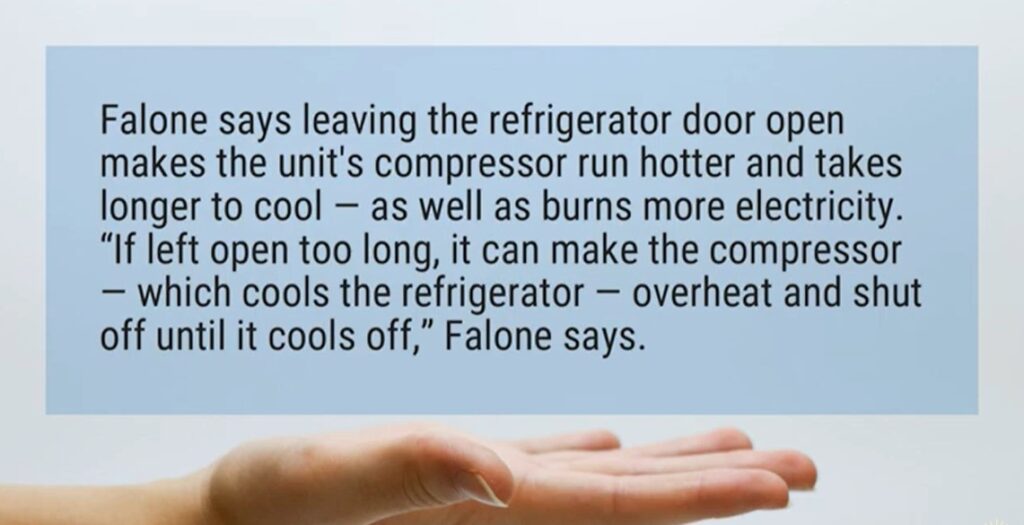
Risk Of Mold And Bacteria Growth
Mold and bacteria can pose health risks and affect the overall cleanliness of your refrigerator. Mold can produce allergens and irritants, which can cause respiratory issues and allergic reactions in some individuals. Bacteria, such as E. coli and Salmonella, can lead to foodborne illnesses if contaminated food is consumed.
Preventing mold and bacterial growth requires proper ventilation and air circulation. Leaving the refrigerator doors open while unplugged allows fresh air to flow and helps maintain a drier environment, making it less favorable for mold and bacteria to thrive.
Ensuring Doors Remain Open When Unplugged
Keeping the refrigerator doors open during periods of being unplugged is essential to preventing the risk of mold and bacteria growth. It’s important to note that this applies mainly to extended periods of non-use, such as vacations or extended periods away from home.
By adhering to this practice, you can minimize the chances of returning home to a fridge filled with unpleasant odors, contaminated food, and a potentially difficult and time-consuming cleaning task.
Remember, maintaining proper hygiene and ensuring the cleanliness of your refrigerator is essential for food safety and the overall well-being of your household.
Power Outages Vs. Unplugging And Plugging
Unplugging a refrigerator won’t damage it as long as it’s not plugged back in right away. Leaving a refrigerator unplugged while it is empty is safe and won’t harm the compressor or the appliance. It’s important to unplug the refrigerator correctly to avoid any potential issues.
Comparison Of The Potential Harm Caused By Power Outages And Unplugging
When it comes to the potential harm caused by power outages versus unplugging a refrigerator, there are some key differences to consider. Both scenarios can have an impact on the refrigerator’s compressor, but the extent of the damage can vary.
Let’s take a closer look at the differences:
Power Outages
During a power outage, the refrigerator is suddenly deprived of electricity. This can lead to a rise in temperature inside the fridge, potentially causing food spoilage. While the compressor is not running during a power outage, that doesn’t mean it’s immune to harm.
Unplugging And Plugging
Unplugging the refrigerator while it is running and then immediately plugging it back in can be a cause for concern. When the fridge is unplugged, the gas pressure inside the compressor needs time to dissipate. If it is plugged back in too soon, the compressor motor can become seriously overheated, potentially causing damage.
However, if the refrigerator is unplugged and left disconnected for an extended period of time, there is generally no harm to the compressor or the refrigerator itself. As long as the doors are left open to prevent the growth of mold, unplugging the fridge can be a safe option.
The potential harm caused by power outages and unplugging a refrigerator is different. Power outages can lead to food spoilage, while the risk of damage to the compressor is higher when unplugging and plugging the fridge back in too quickly.
It’s important to consider these factors and take the necessary precautions to ensure the proper functioning and longevity of your refrigerator.
Should You Unplug The Refrigerator For A Long Vacation?
Unplugging a refrigerator for a long vacation won’t damage it, as long as you don’t immediately plug it back in. However, it is best to leave it plugged in to maintain the temperature and preserve the quality of the stored food.
Actions For Maintaining The Fridge’s Condition During Extended Absences
If you’re planning to be away from home for a long vacation, there are steps you can take to ensure your refrigerator stays in good condition:
- Clean and empty the refrigerator: Before unplugging, remove all perishable items and give the refrigerator a thorough cleaning. This will prevent any unpleasant odors or mold growth while you’re away.
- Unplug and leave the door open: After cleaning and emptying, unplug the refrigerator and leave the door slightly open. This will allow air circulation and prevent any potential mold or mildew growth.
- Consider using a freezer block: If you have perishable items in your freezer that you don’t want to spoil, you can place a freezer block or two inside. This will help maintain the temperature and ensure that your frozen goods stay intact.
By following these recommended actions, you can minimize the chances of any issues occurring while your refrigerator is unplugged.
Consider The Fridge’s Current Condition Before Making The Decision
Before deciding to unplug your refrigerator for a long vacation, it’s crucial to assess its current condition.
- Age and maintenance history: If your refrigerator is relatively new and has been well-maintained, the risk of any damage occurring from unplugging it is minimal. However, if your refrigerator is older or has experienced frequent issues, it might be better to consult with a professional before making a decision.
- Signs of malfunction: Inspect your refrigerator for any signs of malfunction, such as unusual noises, erratic temperature fluctuations, or leaking. If you notice any of these issues, it’s recommended to have your refrigerator serviced before unplugging it for an extended period of time.
Considering your fridge’s current condition will help you make an informed decision and avoid potential damage.
Remember, unplugging a refrigerator for a long vacation is generally safe, but it’s essential to take the necessary precautions to maintain its condition.
By following these recommended actions and considering your fridge’s current state, you can enjoy your vacation without worrying about any potential issues upon your return.
Unplugging The Refrigerator For Energy Savings
Unplugging a refrigerator does not damage it, except if it is unplugged while running and then immediately plugged in again, which can overheat the compressor motor. However, leaving the refrigerator unplugged for an extended period poses no harm to the appliance.
Myth Debunked: Unplugging Doesn’t Damage The Fridge
Unplugging your refrigerator for energy savings is generally a safe and eco-friendly practice. However, there is a widespread misconception that unplugging a refrigerator can cause damage to the appliance.
We are here to debunk this myth and assure you that unplugging your fridge won’t harm it, as long as you follow the proper precautions.
Contrary to popular belief, simply unplugging the refrigerator won’t damage it. The real concern arises when the refrigerator is unplugged while it’s running and then immediately plugged back in before the gas pressures within the compressor have enough time to dissipate.
This can potentially lead to the compressor motor overheating and causing damage.
Tips For Safe And Proper Reconnection After Unplugging
- Wait before plugging it back in: Allow at least 5 to 10 minutes for the gas pressures to equalize before plugging the fridge back in. This will help prevent any potential damage to the compressor motor.
- Inspect the power cord: Before plugging back in, check the power cord for any signs of wear or damage. If you notice any issues, it’s advisable to replace it to avoid electrical hazards.
- Securely plug it into a grounded outlet: Ensure that the power cord is firmly connected to a properly grounded outlet. This will help maintain a constant and safe power supply to your refrigerator.
- Allow time for temperature stabilization: Once plugged back in, give your refrigerator some time to stabilize its temperature before placing any perishable items inside. This will help maintain food safety and quality.
By adhering to these guidelines, you can safely unplug and reconnect your refrigerator, enjoying the energy-saving benefits without compromising the appliance’s performance or lifespan.
Remember, periodic unplugging and cleaning of your refrigerator can help reduce energy consumption and save you money in the long run. Just make sure to carefully follow the proper reconnection procedure outlined above to ensure the continued functionality of your appliance.
Unplugging your refrigerator for energy savings is a simple and effective way to contribute towards a greener lifestyle. So go ahead and unplug, but always remember to reconnect safely!
Can I unplug my fridge for 5 minutes?
Absolutely, go ahead and unplug your fridge for 5 minutes. It’s a quick and simple way to troubleshoot minor issues and give the system a brief reset. If the problem persists, we can explore other solutions.
Will unplugging a refrigerator reset it?
Yes, unplugging a refrigerator for a few minutes can act as a soft reset, resolving minor glitches. It allows the system to be recalibrated. Give it a try, and if the issue persists, we can delve deeper into the troubleshooting process.
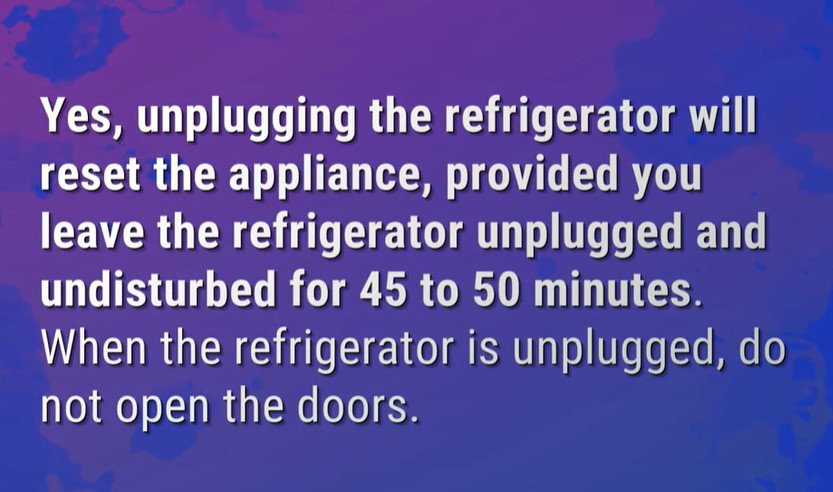
What is the effect on a refrigerator if it is switched off daily at night?
Switching off your refrigerator nightly won’t cause significant harm, but it may lead to a slightly increased energy consumption when the fridge has to cool down again in the morning. Also, frequent temperature fluctuations could affect food preservation.
For optimal efficiency, it’s generally recommended to keep refrigerators running continuously. If energy conservation is a concern, consider adjusting the thermostat or exploring other energy-saving options.
Unplugging a Fridge and Plugging It Back In
Unplugging a refrigerator and then plugging it back in can serve as a basic troubleshooting step to reset the appliance or address minor issues. This action essentially restarts the refrigerator’s system, allowing it to resume normal operations. However, it’s important to note that, for more serious problems, professional assistance may be required.
Should I Unplug My Refrigerator If Away for Four Months?
If you plan to be away from home for an extended period, around four months in this case, it’s advisable to empty the refrigerator, turn it off, and leave the doors open to prevent odors and mold growth.
However, if the contents inside are non-perishable and the power supply is reliable, keeping it plugged in with the temperature adjusted higher can help maintain a stable environment.
I Accidentally Unplugged My Fridge
If you accidentally unplugged your fridge, simply plugging it back in should resume normal operation. However, keep in mind that during the time it was unplugged, the temperature inside may have risen, affecting the freshness of perishable items. Check the contents for any signs of spoilage.
Can Unplugging a Fridge Reset It?
Yes, unplugging a fridge for a short period and then plugging it back in can be a simple way to reset the appliance. This action allows the refrigerator’s systems to restart, potentially resolving minor issues. However, for more complex problems, professional assistance may be necessary.
Can You Leave a Refrigerator Unplugged for a Year?
Leaving a refrigerator unplugged for a year is generally not recommended. The appliance is designed to run continuously, and an extended period without power may lead to issues such as mold growth, unpleasant odors, or damage to certain components.
If you need to store a refrigerator for an extended period of time, it’s advisable to clean it thoroughly, leave the doors ajar, and consider using a dehumidifier in the storage space.
How Long Do I Unplug My Fridge to Reset It?
Unplugging a fridge for a few minutes is typically sufficient to reset it. This brief interruption allows the appliance to restart its systems and may resolve minor issues. If problems persist, consulting the user manual or seeking professional assistance is recommended.
If You Unplug a Refrigerator, Will It Leak?
Unplugging a refrigerator itself should not cause it to leak. However, if there is already a water leak or condensation inside the appliance, it may become more noticeable when the power is disconnected.
Regular maintenance, such as checking for and addressing leaks, is important to prevent water-related issues in refrigerators.
FAQs: Does Unplugging A Refrigerator Damage It?
Is It Ok To Unplug A Fridge?
Unplugging a fridge is not recommended. The temperature inside the fridge needs to be maintained for food quality and to prevent bacterial growth. Unplugging it can lead to temperature fluctuations and the spoilage of food. It is best to leave the fridge plugged in, even when not in use at night, to preserve food quality.
How Long Can You Leave A Refrigerator Unplugged?
Unplugging a refrigerator won’t damage it, but avoid unplugging it while running and plugging it back in right away. Leaving it unplugged doesn’t harm the compressor, so there’s no time limit. However, if you unplug it with the doors closed, mold can grow.
It’s best to leave the fridge plugged in to maintain temperature and preserve food quality.
Is It Ok To Unplug The Refrigerator Every Night?
No, it is not recommended to unplug the refrigerator every night. The temperature inside the refrigerator needs to be maintained at a certain level to preserve the quality of the food stored inside. When the fridge is unplugged, the temperature rises, increasing the chances of bacterial growth and making the food dangerous to consume.
How Long Should I Leave My Refrigerator Unplugged Before Plugging It Back In?
Unplugging a refrigerator won’t damage it, but it’s important to wait before plugging it back in. If the fridge is unplugged while running and then immediately plugged in again, the compressor motor may overheat. So it’s recommended to wait for the gas pressures to dissipate before plugging it back in.
Conclusion
Unplugging a refrigerator for a short period of time will not cause any damage. However, it is important to avoid immediately plugging it back in, as it can overheat the compressor motor. When going on a long vacation or if your fridge is not in optimal condition, it is recommended to unplug it.
Leaving the fridge unplugged for extended periods will not harm the compressor or the refrigerator itself. It is best to leave the door open to prevent the growth of mold. Ultimately, unplugging a fridge won’t affect its performance as long as you follow these precautions.
